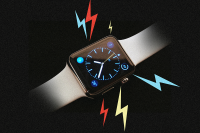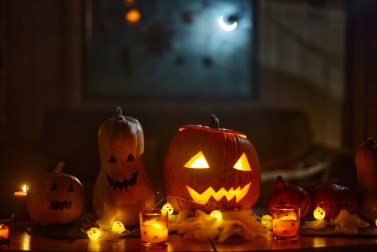I still remember the day when, as an adult in my twenties, I was informed by a well-wisher that Aslan from The Lion, The Witch And The Wardrobe was really Jesus. As this was before my religious awakening, and I was quite the militant atheist at the time, I became rather irate at this revelation. How dare ‘they’ slip a moral message in amongst all that magic and wonder! Now, of course, I see that compared to the story of Christianity itself, a bunch of talking critters is very pedestrian stuff indeed.
Turn on the television, dip into a streaming service or drag yourself out to the cinema and there she is
Still, I was pleased that I was able to have a childlike stay of innocence rather than bear the burden of my favourite bedtime book being about radiant redemption and life eternal. Talking of bears (talking bears, at that) I feel sorry for kiddies today on quite a few grounds, but most of all because of Paddington. For it is obvious to all, no matter how small, that the irregular migrant from Peru is not simply a talking critter, but a hybrid of Nelson Mandela and Mahatma Gandhi, with a spritz of Albert Schweitzer thrown in.
The great Gareth Roberts has written in this august organ of his growing loathing of the duffel-coated daemon’s role in lowering the IQ of public discourse: ‘Paddington has become a symbol of arch tweeness in adults who really should know better…of course the simple of mind and thought have latched on to Paddington and his immigration status, because it suits their frequently infantile world view.’ But another reason to be dismayed by the appearance of the new Paddington film, Paddington in Peru, is that it stars Olivia Colman, an actress whose constant reappearance when one imagines the coast is finally clear and we’ve suffered enough reminds one of nothing so much as recurrent cystitis.
Turn on the television, dip into a streaming service or drag yourself out to the cinema and there she is. The employment rate for actors is around four per cent; when an actor comes along who seems to be getting enough work for five people, you have to wonder why they’re getting it. Does she have lovely manners and a great on-set attitude? This can go a long way; when my book Sugar Rush was televised, I’d have picked either of the two female leads to make it big. The actor who I found the least promising made a point of coming up to me and thanking me for the opportunity; his name was Andrew Garfield and he would go on to become the toast of Hollywood.
There seems no end to Colman’s trajectory of perfectly assimilated fame and fortune; even more impressive considering that she attended teacher training college, has three children and for a long time made a living doing voice-overs for television commercials, continuing with them even when she was getting loads of acting work; notably, saying ‘Be kind to your behind’ for Andrex and playing a gorilla for Glade air fresheners. (And then, of course, there’s that more recent British Airways one, which she appears to have abandoned – or ‘suspended’ – her eco-warrior principles for.)
Her first TV credit proved to be an unbelievably jammy one: appearing in a since-forgotten sketch show (Bruiser) whose writers happened to include David Mitchell and Robert Webb, Richard Ayoade and Ricky Gervais, before any of them were famous. Her undoubted way with a comic line was soon winning her smallish roles in a handful of great TV comedies and an ocean-going-liner-load of mediocre Radio 4 ones, but her most successful early work was in the Mitchell and Webb sketch shows and their sitcom Peep Show.
Whatever the reason for the rise and reign of Olivia Colman, each era gets the iconic film couple it deserves
In the former, she was often consigned to ‘gratifyingly silent’ subsidiary roles, a la Carol Cleveland in Monty Python. But whenever she was given a chance to stretch her legs it was easy to see her strengths: a forensic understanding of middle-class speech patterns and standards of behaviour, coupled with an unmatched ability to convey the wounded civility and subtle malice of a middle-class person who feels that said standards have not been met. Those qualities were amplified in her Peep Show character Sophie, the self-styled nicest girl in the office who seamlessly transforms into a moody, entitled nightmare the minute David Mitchell’s character proposes to her (‘And you’re not going to get Nana’s cottage so you can shove it up your a***hole!’). It was an astonishing performance on both fronts, but her agent encouraged her to distance herself from the show, and future M&W projects, on the basis that she risked becoming too closely associated with them.
Although her career is inarguably thriving – with one Oscar, four BAFTAs and a slew of noms under her belt – opportunities to show her full comic range seem to have dwindled. The fact that her most recent outing was as a nun who turns out to be bad in Paddington in Peru (whoops, SPOILERS if you’re tragic enough to want to see it!) says everything about her current position. I’ll happily admit that the fault here is probably as much to do with me, as I am allergic to cosiness, the currency which Colman deals in even when effing and jeffing up a sweary storm in films like The Favourite and Wicked Little Letters – she always ‘stays classy’. This is invariably limiting to an actors repertoire.
Privately educated, Colman is part of the wholesale colonisation of acting by the upper-middle classes
It’s ironic that Colman became a ‘National Treasure’ playing the Queen in The Crown at the time when the actual Queen – the ultimate National Treasure – was experiencing a level of turmoil in her own reign unseen since the death of Diana; has the nation now invested in Colman the unswerving belief it once had in our beloved monarch? It’s an easy mistake to make; she has Resting Rich Face and it’s impossible to imagine her being ‘common’, even when she trowels on an excruciating Cockney accent to rival Dick Van Dyke in Mary Poppins. Privately educated, she is part of the wholesale colonisation of acting by the upper-middle classes.
Colman is not just a National Treasure – always annoying – but a National Thespian Treasure, and they’re even worse than the standard kind. You’ll know them because invariably they seem to imply that their success was somehow organic, and that only other (shallow, grasping) people are driven by attention-seeking and greedy for money. But secretly, most NTTs would have sold their mum in order to make it, especially if their mum voted Leave.
NTTs are especially prone to what I call Radical Twee and can’t open their cake-holes without mouthing the centrist platitudes which we’ve all heard a million times before; a consequence of progressives becoming the new establishment. Thus Colman has spoken out on ‘trans rights’ (she signed a letter condemning violence and discrimination against trans women), put her name to a letter describing Israel’s retaliation against Hamas as “cruel beyond words” and called on Labour to increase investment in clean energy (what about pocketing that cheque from British Airways?). In an interview with the Sunday Times in 2019, she described herself as a ‘leftie-monarchist’; there’s no such thing, of course, though many thespian dolts seem to pretend there is. It simply means you want to have a pat on the head from the arts establishment for holding your luxury beliefs while being free to hob-nob at the Palace when summoned.
We live in a time when actors – once glamorous opportunists from humble beginnings – are the new public-facing priests of the religion of Woke, preaching solidarity with refugees from the safety of the First Class Flight Lounge. But fortunately and not entire coincidentally, celebrities who dabble in politics are disliked as never before, as the Kamala Harris campaign proved. To see one with an almost apologetic demeanour for being paid a fortune for succeeding at something they love – perhaps as an unconscious penance for the seizing of acting opportunities for the class who would welcome escape from regular boring jobs more than most – seems some kind of honourableness in these strangest of days.
Whatever the reason for the rise and reign of Olivia Colman, each era gets the iconic film couple it deserves. The noble ‘40s had Bogart and Bacall; the sexy ‘60s Burton and Taylor. We are blessed with Colman and Paddington; the First Couple of Radical Twee.








Comments